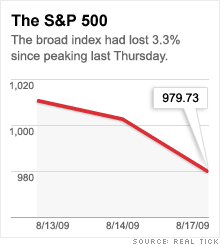By Stuart Wallace
Aug. 18 (Bloomberg) -- European stocks and U.S. futures advanced and industrial metals climbed as a biggest-than- estimated increase in German investor confidence and earnings from Home Depot Inc. indicated the global economy is recovering.
The MSCI World Index of 23 developed nations added 0.2 percent at 2:12 p.m. in London, rebounding from its biggest retreat since April. Futures on the Standard & Poor’s 500 Index gained 0.3 percent. Aluminum rose 3.3 percent and nickel 2.4 percent on the London Metal Exchange after a two-day drop. The yen fell against every one of the most-traded currencies tracked by Bloomberg except the Swiss franc.
The ZEW Center for European Economic Research index of investor and analyst expectations rose to 56.1 in August from 39.5 in July, exceeding the median forecast in a Bloomberg News survey for a reading of 45. Stocks trimmed some of their earlier gains after a Commerce Department report showed U.S. housing starts unexpectedly fell in July.
“There is still much to be optimistic about for the second half of the year,” said Bill O’Neill, the London-based strategist at Merrill Lynch Global Wealth Management, which has $1.1 trillion in assets. “This ‘two steps forward, one step back’ pattern is typical of phases covering the end of a recession.”
The Dow Jones Stoxx 600 Index of European shares added 0.6 percent, recovering from the biggest one-day drop since July 2, as raw-material producers gained with metals. A 43 percent rebound since March 9 has left the regional measure valued at 40.2 times the profits of its companies, near the most expensive since 2003, weekly data compiled by Bloomberg show.
Mining Company
Rio Tinto Group, the world’s third-biggest mining company, gained 1.9 percent in London, while BHP Billiton Ltd., the largest, added 1.2 percent.
HSBC Holdings Plc rose 1.9 percent. Europe’s biggest bank was raised to “buy” from “neutral” at Goldman Sachs Group Inc., which said provisions and losses at HSBC may decline.
Home Depot, the largest home-improvement retailer, rose 2.7 percent in German trading after reporting second-quarter profit that fell less than analysts estimated and increasing its full- year earnings forecast.
Copper for delivery in three months rose 0.3 percent to $6,065 a metric ton on the LME, paring an earlier advance of as much as 3.3 percent. The average U.S. home contains 440 pounds (0.2 ton) of copper, according to the Copper Development Association.
Stocks and commodities tumbled yesterday after foreign direct investment in China fell and Japan’s economy grew less than economists estimated, reigniting concern the rally was overdone.
Economic Confidence
Confidence in the world economy surged to a 22-month high in August on signs the first global recession since World War II is approaching an end, a Bloomberg survey of users on six continents showed last week. The U.S. unemployment rate dropped in July for the first time since April 2008, data from the Labor Department showed this month, while the German and French economies unexpectedly grew last quarter, government figures indicated last week.
Emerging-market stocks rose from a four-week low and bonds snapped a six-day losing streak.
The MSCI Emerging Markets Index added 0.4 percent to 823.14 after dropping the most in 5 1/2 months yesterday.
Bond rose, pushing the extra yield investors demand to own developing nations’ debt instead of U.S. Treasuries down 3 basis points to a 3.81 percentage points., according to JPMorgan Chase & Co.’s EMBI+ Index. The decline snaps six days of increases, the longest streak since November.
Composite Index
China’s Shanghai Composite Index increased 1.4 percent, the most two weeks, and Poland’s WIG20 benchmark added as much as 1.3 percent to a three-day high after the country’s equities were raised to “overweight” from “equal-weight” by Morgan Stanley.
Treasuries declined, sending the yield on the benchmark 10- year note up 2 basis points to 3.49 percent. The 30-year yield increased 1 basis point to 4.34 percent.
The yen dropped most against the South African rand, weakening 1.4 percent, and fell 0.3 percent against the euro, amid revived demand for higher-yielding currencies.
To contact the reporter on this story: Stuart Wallace in London at swallace6@bloomberg.net Last Updated: August 18, 2009 09:20 EDT






